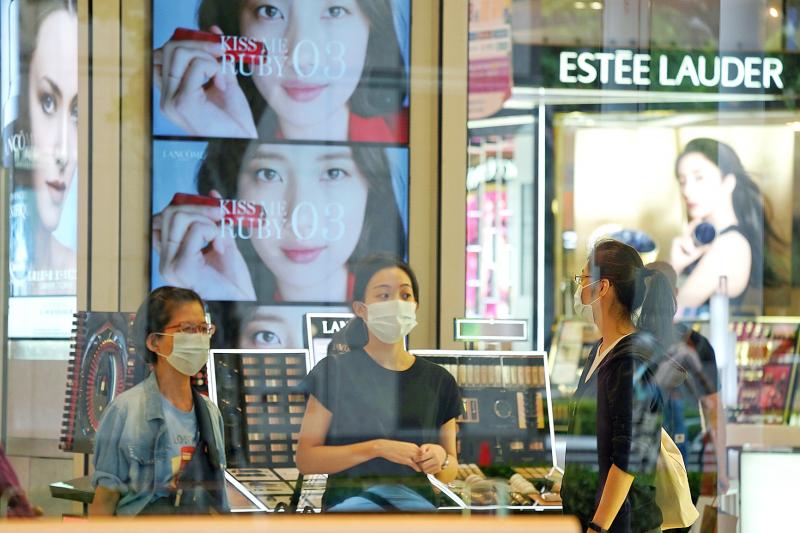The government’s business climate monitor last month flashed “green” for a second consecutive month, as the nation’s economy grew steadily on the back of robust export demand, the National Development Council (NDC) said yesterday.
Major economic barometers, such as industrial production, manufacturing sales and business sentiment increased, raising the total score one point to 27, the council said.
The council uses a five-color system to portray the nation’s economic state, with “green” indicating steady growth, “red” suggesting overheating and “blue” signaling a recession. Dual colors mean it is in transition.

Photo: CNA
Exports might be boosted further with the release of new consumer electronics by global technology titans ahead of the holiday season next month and in December, council research director Wu Ming-huei (吳明蕙) said, referring mainly to Apple Inc’s new iPhones.
Taiwanese companies supply chips, camera lenses, casings, battery packs and other components for the popular mobile phones.
Domestically, wholesale and retail operators, as well as food and beverage providers, all reported a significant upturn in business, bolstered by national holidays and the government’s Triple Stimulus Vouchers, which were used to boost consumer spending, the council said.
The gauges on exports and imports of capital equipment shed amounts attributable chiefly to the appreciation of the New Taiwan dollar and fewer working days, Wu said, adding they should not be taken as signs of losses of momentum.
Exports posted a strong showing in US dollar terms, but the council calculates the nation’s economic data using the NT dollar, she said.
Foreign exchange has become less of a threat to companies with a lead in technology that are prepared for financial volatility, the council said.
The series of leading indicators, used to predict the economic outlook in the coming six months, rose 1.63 percent to 105.77, backed by better export orders, manufacturing sentiment and labor accession rates, as well as new construction floor space, the council said.
Only the reading on real imports of semiconductor equipment registered a negative cyclical movement from a month earlier, it said.
The leading indicators have accumulated a 7.35 percent increase over the past six months, affirming that the recovery is stable, Wu said.
“Invest in Taiwan” programs would continue to lend support, she added.
The council said that the index of coincident indicators, which reflects the current economic situation, rose 1.12 percent to 102.39, gaining for the fourth consecutive month.
Apart from strong retail and wholesale revenues, power consumption and manufacturing sales data were also encouraging, it said.
The council would be on the lookout for downside risks linked to the COVID-19 pandemic and the US presidential election, it added.

SELL-OFF: Investors expect tariff-driven volatility as the local boarse reopens today, while analysts say government support and solid fundamentals would steady sentiment Local investors are bracing for a sharp market downturn today as the nation’s financial markets resume trading following a two-day closure for national holidays before the weekend, with sentiment rattled by US President Donald Trump’s sweeping tariff announcement. Trump’s unveiling of new “reciprocal tariffs” on Wednesday triggered a sell-off in global markets, with the FTSE Taiwan Index Futures — a benchmark for Taiwanese equities traded in Singapore — tumbling 9.2 percent over the past two sessions. Meanwhile, the American depositary receipts (ADRs) of Taiwan Semiconductor Manufacturing Co (TSMC, 台積電), the most heavily weighted stock on the TAIEX, plunged 13.8 percent in

A wave of stop-loss selling and panic selling hit Taiwan's stock market at its opening today, with the weighted index plunging 2,086 points — a drop of more than 9.7 percent — marking the largest intraday point and percentage loss on record. The index bottomed out at 19,212.02, while futures were locked limit-down, with more than 1,000 stocks hitting their daily drop limit. Three heavyweight stocks — Taiwan Semiconductor Manufacturing Co (TSMC, 台積電), Hon Hai Precision Industry Co (Foxconn, 鴻海精密) and MediaTek (聯發科) — hit their limit-down prices as soon as the market opened, falling to NT$848 (US$25.54), NT$138.5 and NT$1,295 respectively. TSMC's

TARIFFS: The global ‘panic atmosphere remains strong,’ and foreign investors have continued to sell their holdings since the start of the year, the Ministry of Finance said The government yesterday authorized the activation of its NT$500 billion (US$15.15 billion) National Stabilization Fund (NSF) to prop up the local stock market after two days of sharp falls in reaction to US President Donald Trump’s new import tariffs. The Ministry of Finance said in a statement after the market close that the steering committee of the fund had been given the go-ahead to intervene in the market to bolster Taiwanese shares in a time of crisis. The fund has been authorized to use its assets “to carry out market stabilization tasks as appropriate to maintain the stability of Taiwan’s

In a small town in Paraguay, a showdown is brewing between traditional producers of yerba mate, a bitter herbal tea popular across South America, and miners of a shinier treasure: gold. A rush for the precious metal is pitting mate growers and indigenous groups against the expanding operations of small-scale miners who, until recently, were their neighbors, not nemeses. “They [the miners] have destroyed everything... The canals, springs, swamps,” said Vidal Britez, president of the Yerba Mate Producers’ Association of the town of Paso Yobai, about 210km east of capital Asuncion. “You can see the pollution from the dead fish.